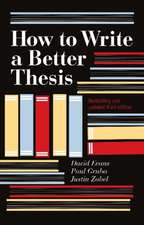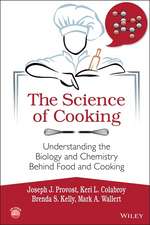Food Waste: Home Consumption, Material Culture and Everyday Life: Materializing Culture
Autor David M. Evansen Limba Engleză Paperback – 22 oct 2014
| Toate formatele și edițiile | Preț | Express |
|---|---|---|
| Paperback (1) | 183.16 lei 6-8 săpt. | |
| Bloomsbury Publishing – 22 oct 2014 | 183.16 lei 6-8 săpt. | |
| Hardback (1) | 654.19 lei 6-8 săpt. | |
| Bloomsbury Publishing – 22 oct 2014 | 654.19 lei 6-8 săpt. |
Din seria Materializing Culture
-
 Preț: 280.55 lei
Preț: 280.55 lei - 9%
 Preț: 935.80 lei
Preț: 935.80 lei -
 Preț: 233.55 lei
Preț: 233.55 lei - 14%
 Preț: 185.02 lei
Preț: 185.02 lei -
 Preț: 339.93 lei
Preț: 339.93 lei -
 Preț: 350.53 lei
Preț: 350.53 lei -
 Preț: 364.51 lei
Preț: 364.51 lei - 18%
 Preț: 1002.60 lei
Preț: 1002.60 lei - 13%
 Preț: 230.03 lei
Preț: 230.03 lei -
 Preț: 349.80 lei
Preț: 349.80 lei - 18%
 Preț: 999.34 lei
Preț: 999.34 lei -
 Preț: 350.95 lei
Preț: 350.95 lei -
 Preț: 268.59 lei
Preț: 268.59 lei -
 Preț: 233.37 lei
Preț: 233.37 lei -
 Preț: 275.90 lei
Preț: 275.90 lei - 14%
 Preț: 191.04 lei
Preț: 191.04 lei -
 Preț: 231.89 lei
Preț: 231.89 lei -
 Preț: 191.67 lei
Preț: 191.67 lei -
 Preț: 349.80 lei
Preț: 349.80 lei - 26%
 Preț: 570.43 lei
Preț: 570.43 lei - 18%
 Preț: 897.38 lei
Preț: 897.38 lei - 18%
 Preț: 997.11 lei
Preț: 997.11 lei - 11%
 Preț: 216.70 lei
Preț: 216.70 lei -
 Preț: 349.80 lei
Preț: 349.80 lei -
 Preț: 348.87 lei
Preț: 348.87 lei -
 Preț: 231.42 lei
Preț: 231.42 lei - 13%
 Preț: 232.07 lei
Preț: 232.07 lei - 18%
 Preț: 999.51 lei
Preț: 999.51 lei - 18%
 Preț: 1008.17 lei
Preț: 1008.17 lei -
 Preț: 231.99 lei
Preț: 231.99 lei
Preț: 183.16 lei
Preț vechi: 213.54 lei
-14% Nou
Puncte Express: 275
Preț estimativ în valută:
35.05€ • 36.46$ • 28.94£
35.05€ • 36.46$ • 28.94£
Carte tipărită la comandă
Livrare economică 15-29 aprilie
Preluare comenzi: 021 569.72.76
Specificații
ISBN-13: 9780857852335
ISBN-10: 0857852337
Pagini: 136
Ilustrații: 2 bw illus
Dimensiuni: 156 x 234 x 9 mm
Greutate: 0.25 kg
Editura: Bloomsbury Publishing
Colecția Bloomsbury Academic
Seria Materializing Culture
Locul publicării:London, United Kingdom
ISBN-10: 0857852337
Pagini: 136
Ilustrații: 2 bw illus
Dimensiuni: 156 x 234 x 9 mm
Greutate: 0.25 kg
Editura: Bloomsbury Publishing
Colecția Bloomsbury Academic
Seria Materializing Culture
Locul publicării:London, United Kingdom
Caracteristici
A short and very readable book on a timely subject that will be useful to scholars approaching the subject from a range of difference disciplines
Notă biografică
David Evans is Lecturer in Sociology and Research Fellow of the Sustainable Consumption Institute at the University of Manchester, UK.
Cuprins
AcknowledgmentsPrologue: The Social Life (and Death) of Food1. Bringing Waste to the Table2. Ordinary Domestic Practice: Conceptualizing, Researching, Representing3. Contextualising Household Food Consumption4. Anxiety, Routine and Over-provisioning5. The Gap in Disposal: From Surplus to Excess?6. Bins and Things7. Gifting, Re-use and SalvageConclusion: Living with Food, Reducing WasteNotesBibliographyIndex
Recenzii
A short, lively and very stimulating book ... [and] an excellent example of recent research practices in the field of consumption and everyday lives.
Evans draws on studies of consumption and materials culture alongside social science perspectives on everyday life and the home to get to the bottom of why we waste food ... Simply put, food is wasted when people do not want to eat it anymore. However, Evans suggests that 'food' becomes 'waste' through a complex and anxiety-laden process', and therefore should not be taken as evidence of households not caring about the food that they waste ... Food Waste is aimed at social scientists and students, but could be of benefit to those in the waste industry wanting to take a different look at why we waste food.
Food Waste is both relevant and timely, offering new insights into 'the role of material culture in shaping' everyday practices of food consumption, and thereby, food waste production . Evans challenges normative views of wastefulness . demonstrating that households are undeniably aware of their production of (and discomfort with) food waste. Furthermore, he argues that food waste is more usefully conceptualised in relation to norms of caring that constitute feeding a family and loved ones than as an 'end of pipe' problem to be fixed by households, consumers and public waste management systems . Food Waste is a well-written and well-researched book, grappling with big questions about the transformation of food into waste. In it Evans provides an accessible account of the complexity of household food acquisition and disposal practices and offers a perceptive categorical framework upon which further academic work on food waste might build.
Evans' book provides a refreshingly non-judgmental exploration of the practices that lead consumers to waste food. ... A highly accessible, thought provoking and concise work, that offers a conceptual framework that will no doubt organize and position future studies of household food waste.
David Evans has set a strong foundation for continuing research into waste scholarship ... Overall this book is at the forefront of looking into [.] how home food takes steps into becoming waste in the environment. Evans' has managed to provoke curiosity about other realms that lie undiscovered in the breadth of waste scholarship.
The real-life stories in the book make the messages compelling, as the reader can easily relate to the examples that we have all lived in our own families. ... The author also presents many practical solutions to this problem [of food waste] that currently is under appreciated in the agricultural and food systems community.
At last a book about waste that does not browbeat and blame consumers! Instead Evans asks fundamental questions that are usually buried under the moral weight of garbage and trash. His careful ethnography brings a blast of fresh air to a timeless and complex problem.
Food and waste are words that are seldom brought together in ways that do not involve morals and moralising. In this book, Evans shows why an understanding of food waste requires going beyond morality. This is material culture studies at its best, an important contribution to a growing body of work on divestment with profound implications for policy makers.
Evans persuasively shows that problems with food 'waste' have little to do with poor planning and uninformed consumers and everything to do with the structures of daily life and ideas about 'proper' eating. This excellent book challenges conventional wisdom and opens up possibilities for rethinking consumer choice and responsible consumption.
Evans draws on studies of consumption and materials culture alongside social science perspectives on everyday life and the home to get to the bottom of why we waste food ... Simply put, food is wasted when people do not want to eat it anymore. However, Evans suggests that 'food' becomes 'waste' through a complex and anxiety-laden process', and therefore should not be taken as evidence of households not caring about the food that they waste ... Food Waste is aimed at social scientists and students, but could be of benefit to those in the waste industry wanting to take a different look at why we waste food.
Food Waste is both relevant and timely, offering new insights into 'the role of material culture in shaping' everyday practices of food consumption, and thereby, food waste production . Evans challenges normative views of wastefulness . demonstrating that households are undeniably aware of their production of (and discomfort with) food waste. Furthermore, he argues that food waste is more usefully conceptualised in relation to norms of caring that constitute feeding a family and loved ones than as an 'end of pipe' problem to be fixed by households, consumers and public waste management systems . Food Waste is a well-written and well-researched book, grappling with big questions about the transformation of food into waste. In it Evans provides an accessible account of the complexity of household food acquisition and disposal practices and offers a perceptive categorical framework upon which further academic work on food waste might build.
Evans' book provides a refreshingly non-judgmental exploration of the practices that lead consumers to waste food. ... A highly accessible, thought provoking and concise work, that offers a conceptual framework that will no doubt organize and position future studies of household food waste.
David Evans has set a strong foundation for continuing research into waste scholarship ... Overall this book is at the forefront of looking into [.] how home food takes steps into becoming waste in the environment. Evans' has managed to provoke curiosity about other realms that lie undiscovered in the breadth of waste scholarship.
The real-life stories in the book make the messages compelling, as the reader can easily relate to the examples that we have all lived in our own families. ... The author also presents many practical solutions to this problem [of food waste] that currently is under appreciated in the agricultural and food systems community.
At last a book about waste that does not browbeat and blame consumers! Instead Evans asks fundamental questions that are usually buried under the moral weight of garbage and trash. His careful ethnography brings a blast of fresh air to a timeless and complex problem.
Food and waste are words that are seldom brought together in ways that do not involve morals and moralising. In this book, Evans shows why an understanding of food waste requires going beyond morality. This is material culture studies at its best, an important contribution to a growing body of work on divestment with profound implications for policy makers.
Evans persuasively shows that problems with food 'waste' have little to do with poor planning and uninformed consumers and everything to do with the structures of daily life and ideas about 'proper' eating. This excellent book challenges conventional wisdom and opens up possibilities for rethinking consumer choice and responsible consumption.
Descriere
Food Waste is the first academic study to tackle this highly topical subject. Drawing from social science approaches to waste, material culture and everyday life in the home, the author uncovers the reasons behind the vast quantity of food wasted on a daily basis by households and consumers.







